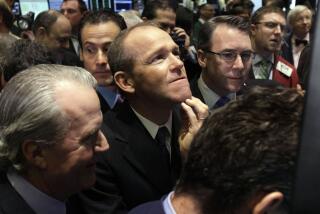Hughes Aircraft Chief Executive Suddenly Retires : Wheelon, 22-Year Veteran, Cites ‘Personal Reasons;’ Currie Named Successor
- Share via
Hughes Aircraft Chairman Albert D. Wheelon abruptly retired Thursday, citing unexplained “personal reasons.”
Wheelon’s retirement from Hughes, a General Motors subsidiary based in Los Angeles, came at a hastily called meeting of Hughes Aircraft directors at GM headquarters in Detroit.
The nine-member Hughes Aircraft board, controlled by GM executives, elected Hughes veteran Malcolm R. Currie as the new chairman. Currie had been president and chief executive at General Motors’ Delco Electronics unit.
A company statement said Wheelon “is retiring for personal reasons, pursuant to the provisions of the Hughes Aircraft Co. retirement plan.” Wheelon is 59, six years shy of normal retirement age at Hughes and only about a year into his tenure as chief executive. He had worked at Hughes since 1966, and became only the third chief executive in the company’s history when he was elected to that position in April, 1987.
Hughes Vice President and chief spokesman Lee Pitt said he could not comment on the reasons for Wheelon’s departure. Through Pitt, Wheelon himself declined to comment.
Hughes President Donald H. White said in a telephone interview that he also could not comment on any of the circumstances surrounding Wheelon’s departure. White declined to say whether Wheelon retired at the request of the board or on his own volition.
Headed Space Group
Wheelon’s sudden retirement came amid what knowledgeable sources describe as an internal investigation of certain business practices involving the sale of Hughes communications satellites. The investigation began late last year.
The internal investigation, sources said, is looking into some business practices at Hughes Space & Communications Group, the El Segundo unit that controls half of the worldwide communications satellite market.
Wheelon was the group’s president for 15 years until he was promoted to executive vice president of Hughes Aircraft in 1986.
According to knowledgeable sources, the internal investigation focuses on the sale of Hughes satellites to Intelsat, an organization that provides international telephone service.
The investigation is said to be examining whether improper payments were made to Intelsat or its officials in connection with contracts it issued to Hughes over a long period of time.
Intelsat has been the subject of controversy in the past. Richard Colino, former Intelsat director general and chief executive, was fired in late 1986 and later pleaded guilty to a scheme to obtain $4.8 million through the rigging of construction and financing contracts for Intelsat’s new headquarters in Washington. Intelsat Deputy Director General Jose L. Alegrett was also fired in the controversy but was not charged.
There is no indication that the internal Hughes investigation is connected to the conspiracy charges that resulted in Colino’s guilty plea.
Colino pleaded guilty to interstate transportation of money obtained by fraud. As director general of Intelsat since 1983, Colino was in charge of design, development, construction and operation of the Intelsat global telecommunications system.
There has been substantial turmoil in the executive ranks at Hughes headquarters in the Westchester district of Los Angeles. Only last month, Hughes Vice Chairman and General Counsel Richard Alden, 63, unexpectedly retired. But Hughes officials said Thursday that Alden’s departure was unrelated to the circumstances surrounding Wheelon’s retirement. Alden declined comment.
Tradition Continued
Wheelon has been a well-known member of the Southern California aerospace community. He has served on the Foreign Intelligence Advisory Board and the Defense Science Board. In 1986, he was a member of the President’s commission that investigated the space shuttle disaster.
He holds a doctorate degree from the Massachusetts Institute of Technology and serves as a trustee of the California Institute of Technology.
The election of Currie to the chief executive’s post at Hughes continues the company’s longstanding tradition of having an engineer as leader of the high-technology concern.
Currie, 61, has a doctorate in engineering from UC Berkeley. He first joined Hughes in 1954 as a member of the technical staff of Hughes Research Laboratories, where he pioneered early research in lasers and traveling-wave tubes, among other technical areas.
He left Hughes in 1969 to join Beckman Instruments as vice president of research and development and corporate planning. In 1973, he was named undersecretary of defense for research and engineering, the third-highest post in the Pentagon.
Currie rejoined Hughes in 1977 as vice president and group executive of the Missile Systems Group and was named executive vice president of Hughes six years later. He became chief of Delco Electronics in February, 1986, shortly after Hughes merged with GM.
More to Read
Inside the business of entertainment
The Wide Shot brings you news, analysis and insights on everything from streaming wars to production — and what it all means for the future.
You may occasionally receive promotional content from the Los Angeles Times.










